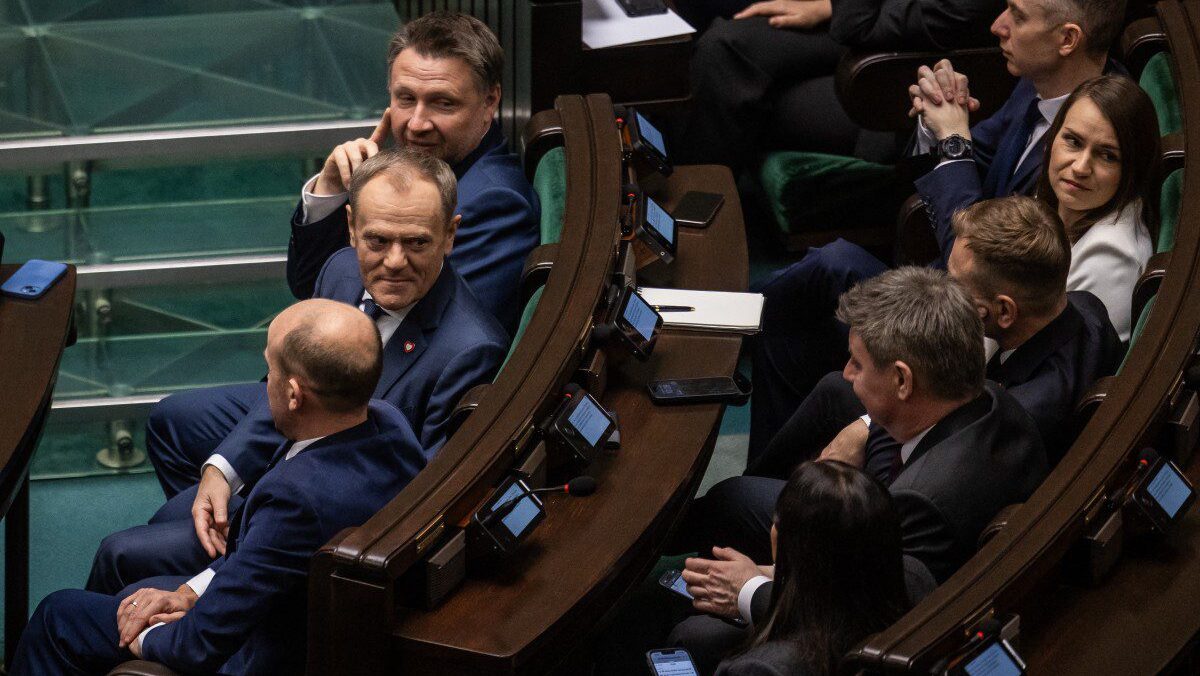
The leaders of the European Union’s institutions welcomed the return of Donald Tusk as Poland’s prime minister with visible glee and enthusiasm, signalling how a shift in Poland from a sovereigntist approach to a globalist one will make it easier for Brussels and Warsaw to cooperate.
Donald Tusk was elected as prime minister late on Monday, December 11th after winning a vote of confidence in parliament. His cabinet will get the nod of approval from parliament on Tuesday evening, and Tusk is to be sworn in by President Andrzej Duda on Wednesday.
Na zaproszenie Prezydenta @AndrzejDuda, po głosowaniu w Sejmie, doszło do spotkania z Premierem @donaldtusk. Ustalono, że po uzyskaniu wotum zaufania, zaprzysiężenie nowego rządu odbędzie się w środę 13.12 o godz. 9:00 w Pałacu Prezydenckim. pic.twitter.com/cNH3o2kZfx
— Grażyna Ignaczak-Bandych (@GIBandych) December 11, 2023
Although conservative-nationalist party Law and Justice (PiS)—in power since 2015—won most of the seats in October’s elections, with 35.4% share of the votes, it failed to win a majority. This paved the way for three political alliances—comprising more than a dozen parties from the Left to the centre-right—to take charge and form a government.
President of the European Council Charles Michel welcomed the reelection of Tusk, who was prime minister of Poland from 2007 to 2014, by saying his “experience and commitment to European values will help in forging a stronger and more united EU.”
Congratulations dear @donaldtusk on becoming the new Prime Minister of Poland!
— Charles Michel (@CharlesMichel) December 11, 2023
I look forward to welcoming you back at the #EUCO table. Your experience and commitment to European values will help in forging a stronger and more united EU.
🇵🇱🇪🇺 pic.twitter.com/s844LbuQLa
European Commission President Ursula von der Leyen didn’t mask her feelings either, stating that Tusk’s commitment to “our European values” would be for the “benefit of the Polish people.”
https://twitter.com/vonderleyen/status/1734271491305247042/history
European Parliament President Roberta Metsola emphasised how the new Polish government would help “tackle current challenges, united.” The parliamentary group of the centre-right-liberal European People’s Party—of which Tusk’s party, Civic Platform, is a member—talked of “the start of a bright era for Poland and its relationship with the EU.”
A new positive chapter begins in Poland's history with the election of Donald Tusk as Prime Minister!
— EPP Group (@EPPGroup) December 11, 2023
🇵🇱 This marks the start of a bright era for #Poland and its relationship with the EU. @donaldtusk pic.twitter.com/dZQWUErncW
The ecstatic outpourings of affection are no surprise, given the fact that the new Warsaw government will likely align with Brussels on the most important topics, whereas the outgoing PiS government had many clashes with European institutions over its conservative stance involving migration, abortion, gender ideology, and LGBT issues. Just like the conservative government in Hungary, it was harshly punished for its deviation from European policy: Poland still hasn’t received its share of money from the EU’s pandemic relief program and has been fined for not complying with EU court decisions. Poland’s constitutional court has drawn the ire of Brussels by repeatedly challenging the primacy of EU law over national law.
PiS party leader Jarosław Kaczyński said his party stands for a sovereign Poland, against “the concept of changing the Polish state into a place of residence for Poles, managed from outside, from Brussels and in fact from Berlin.”
In contrast to PiS, Donald Tusk—who has previously served as president of the European Council and leader of the European People’s Party—will likely maintain a stronger relationship with Germany and the EU and loosen ties with the Central European alliance of the Visegrád nations. In his policy speech on Tuesday, he vowed that, under his government, Poland would regain its “rightful position” in the European Union. He promised to “restore the rule of law,” unblock €59.8 billion in grants and loans from the EU, and “improve women’s access to abortion.” He reiterated his previous promise of revenge, saying that “justice will be served,” and that anyone who “broke the law” during PiS rule will be held to account.
Dziękuję Polsko! pic.twitter.com/LyhAm9Shc2
— Donald Tusk (@donaldtusk) December 11, 2023
He previously vowed to simplify the gender-recognition process for people identifying as transgender and introduce same-sex civil partnerships. The programme accepted by the parties of the new coalition also includes a proposed hate speech law that would persecute inciting hatred on the basis of sexual orientation or gender identity. While he has previously warned of the dangers of a flood of Muslim immigrants to Poland, on Tuesday Tusk said “I protest against the hostile attitude of the authorities towards immigrants,” adding: “we can protect the border and be human.”
But experts warn that Tusk will have to navigate a much trickier government than the ones he has been used to. As we previously reported, Tusk will have an extremely difficult time maintaining the stability of an ideologically diverse government that will consist of three alliances and more than a dozen parties whose only common aim was to oust PiS from power. Divisions have already arisen with disagreements on migration and abortion issues.
“The first conflicts will arise over the issue of agreement in the local elections, then the European elections, and the preparations for the presidential elections. All of this will generate conflicts. It is very difficult to govern in a system where we have four strong parties and many smaller ones,” political scientist Sergiusz Trzeciak told Polish publication Do Rzeczy.
Tusk will have to listen to his conservative allies both within his own party and that of the Third Way centre-right alliance, which contains the socially conservative Christian democratic anti-abortion Polish People’s Party.
